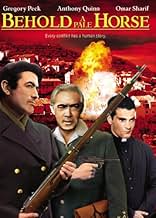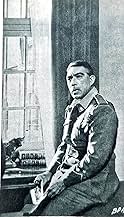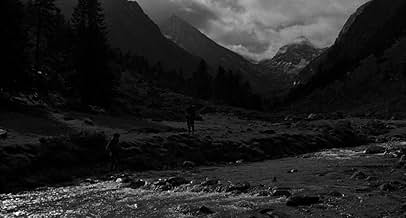CALIFICACIÓN DE IMDb
6.7/10
2.4 k
TU CALIFICACIÓN
El famoso bandido español Artiguez regresa a su pueblo natal español después de 20 años en el exilio francés, pero el policía español Vinolas le tiende una trampa.El famoso bandido español Artiguez regresa a su pueblo natal español después de 20 años en el exilio francés, pero el policía español Vinolas le tiende una trampa.El famoso bandido español Artiguez regresa a su pueblo natal español después de 20 años en el exilio francés, pero el policía español Vinolas le tiende una trampa.
- Dirección
- Guionistas
- Elenco
Marietto
- Paco Dages
- (as Marietto Angeletti)
Perrette Pradier
- Maria, Hussy
- (as Perette Pradier)
- Dirección
- Guionistas
- Todo el elenco y el equipo
- Producción, taquilla y más en IMDbPro
Opiniones destacadas
I had been looking forward to this one for some time, due to its rather imposing credentials; it's certainly well-made and acted but also heavy-going, slow and excessively talky.
Gregory Peck is even stiffer and glummer than usual as a washed-out guerrilla fighter; Anthony Quinn is generally more subdued than is customary for him, being effectively cast against type as Peck's nemesis (though his character is completely absent from the film's mid-section); after a belated entrance, Omar Sharif manages to steal the acting honors from under the nose of his more experienced companions by giving a moving portrayal of a conflicted priest. The excellent cast is rounded out by Paolo Stoppa, Christian Marquand, Daniela Rocca, Mildred Dunnock, Rosalie Crutchley and Michel Lonsdale.
Ultimately, the film lacks the touch of greatness but the unusual subject matter (adapted from an Emeric Pressburger novel) and the surprising but affecting child's eye view it takes of events keep one watching. Furthermore, the climactic assault on the hospital is both suspenseful and exciting and the ever-reliable Maurice Jarre contributes a subtly effective score.
Gregory Peck is even stiffer and glummer than usual as a washed-out guerrilla fighter; Anthony Quinn is generally more subdued than is customary for him, being effectively cast against type as Peck's nemesis (though his character is completely absent from the film's mid-section); after a belated entrance, Omar Sharif manages to steal the acting honors from under the nose of his more experienced companions by giving a moving portrayal of a conflicted priest. The excellent cast is rounded out by Paolo Stoppa, Christian Marquand, Daniela Rocca, Mildred Dunnock, Rosalie Crutchley and Michel Lonsdale.
Ultimately, the film lacks the touch of greatness but the unusual subject matter (adapted from an Emeric Pressburger novel) and the surprising but affecting child's eye view it takes of events keep one watching. Furthermore, the climactic assault on the hospital is both suspenseful and exciting and the ever-reliable Maurice Jarre contributes a subtly effective score.
This excellent film tells the story of a stubborn Spanish republican, Manuel Artiguez, who refused to give up the fight when his side lost the Spanish civil war to the fascists in 1938. The film takes place twenty years later, when after many successful raids, Artiguez has lost the will to continue. However, his adversary, a Spanish police chief called Vinolas, has not yet given up on capturing or killing him and sets a trap for him. The trap and the question of whether Artiguez will fall into it it will keep you on your seat for most of the movie. Three men caught between Artiguez and Vinolas, an informer, a priest, and an idealistic Spanish exile boy, add a rich psychological and moral dimension to the film, following themes of idealism, revenge, and the uses of violence.
"Behold" is a great thriller with highly complex characters and a profound moral sensibility. The idealism of Spanish republicans like the boy is on the one hand supported by the oily and hypocritical Vinolas, and on the other hand undercut by the rawness and violence of Artiguez. Neither of the adversaries is vindicated, but neither are they equivalent to one another. The ending will set you thinking for hours, if you're so inclined.
Performances by Peck (Artiguez) and Quinn (Vinolas) are great. Peck is less stuffy than usual. I'm not generally a fan of earnest, wet-eyed Sharif (the priest), but his performance here suits the movie quite well. I can still hear his voice saying "Did the informer escape? Is the bandit safe?"
My only complaint is that for all of its thematic complexity and richness of character the film is at times somewhat melodramatic and the dialogue is sometimes a little clunky. And for some reason its parts, good characters, good plot, good actors, all excellent, do not quite add up into a perfect whole. Nor is it as good as some of the movies it slightly resembles: Guns of Navarone, Battle of Algiers, Wild Bunch. However, it is definitely worthwhile for fans of 'thoughtful thrillers'.
"Behold" is a great thriller with highly complex characters and a profound moral sensibility. The idealism of Spanish republicans like the boy is on the one hand supported by the oily and hypocritical Vinolas, and on the other hand undercut by the rawness and violence of Artiguez. Neither of the adversaries is vindicated, but neither are they equivalent to one another. The ending will set you thinking for hours, if you're so inclined.
Performances by Peck (Artiguez) and Quinn (Vinolas) are great. Peck is less stuffy than usual. I'm not generally a fan of earnest, wet-eyed Sharif (the priest), but his performance here suits the movie quite well. I can still hear his voice saying "Did the informer escape? Is the bandit safe?"
My only complaint is that for all of its thematic complexity and richness of character the film is at times somewhat melodramatic and the dialogue is sometimes a little clunky. And for some reason its parts, good characters, good plot, good actors, all excellent, do not quite add up into a perfect whole. Nor is it as good as some of the movies it slightly resembles: Guns of Navarone, Battle of Algiers, Wild Bunch. However, it is definitely worthwhile for fans of 'thoughtful thrillers'.
8wilp
I saw this film years ago and it made a deep impression (even if my interest in the Spanish War does bias me in its favour); it's on my short list of works to locate and see again. Its treatment of generations and of legacies is as relevant as ever, now that the number of people living who witnessed that upheaval is shrinking fast. The film will move boys (who can identify with one of the main characters) and will not deprave them with violence, the little violence (if I remember correctly) being more suggestive than explicit. A psychological film with some intensely aesthetic moments.
I watched this movie, and like most of the people have already expressed it, must say that this is truly a classic. The acting crew is excellent with Peck, Shariff and Quinn giving some very intense performances. But the surprise package is the boy who crosses over to the French part where he goes in search of Manueal to ask him to avenge his father's death at the hands of Vinollas. I often read comments that Peck is stuff or wooden on occasions, but I find him one of the most intense actors because of his ability to convey through his eyes. Like most actors, he is gifted of conveying a lot more through his eyes than his body might suggest. He conveys the frailing Manuel artigez here very well. We know that Manuel is tired and wary of the struggle he has pursued so passionately. Full credit to Peck for portraying that very effectively. Omar Shariff is also brilliant as the confused priest. Quinn is natural and we feel a certain angst against him, I do not know why. The end is excellent which again, conveys the human side of Manuel very well. All in all, an excellent movie worth watching on a calm Sunday afternoon.
This is a film which has almost faded into total obscurity, and that's tragic, because it's well worth seeing. It's sort of a thinking person's suspense movie, better appreciated if you know some details about the intricate historical background in which it is set. Even so, it can be appreciated for its dramatic settings and characterizations. It has a complicated plot, to be sure, but the story rolls right along...not a lot of action until the end, but the tension builds steadily. I'm no fan of Peck, but his role here really drew me in. He looks beaten down by a hard life and way too much unhealthy passion. Quinn doesn't have much screen time, but I liked some of the minor characters best...their faces were great. The credit sequence, meshed together perfectly with newsreels, shows a long line of defeated soldiers, their faces reflecting defeat and confusion... a great tracking scene.
Here are some reasons I think the film is unknown: 1. The main character is an atheist communist anti-catholic guerilla bandit. Not a popular icon in American movies. 2. Complex historical background. 3. Knowledge of political situation in Spain a minimum requirement. Not a priority on many American's lists. 4. Black and white photography in 1964. (Hey, I liked the scenery...but you always wonder how it would look in color...and this was a late date for a black and white feature film.) 5. Civil War movies (even Spain's) always run a risk...you might alienate half the audience.
Here are some reasons I think the film is unknown: 1. The main character is an atheist communist anti-catholic guerilla bandit. Not a popular icon in American movies. 2. Complex historical background. 3. Knowledge of political situation in Spain a minimum requirement. Not a priority on many American's lists. 4. Black and white photography in 1964. (Hey, I liked the scenery...but you always wonder how it would look in color...and this was a late date for a black and white feature film.) 5. Civil War movies (even Spain's) always run a risk...you might alienate half the audience.
¿Sabías que…?
- TriviaThe movie was banned in Spain, which was still ruled by Generalisimo Francisco Franco, the fascist victor of the Spanish Civil War.
- ErroresIn the first 5 minutes of the movie it is supposed to be 1939 and the Loyalist (Republican) soldiers are crossing into exile on the French border. As they cross over they are turning in their guns and the first one to turn in his gun turns in a Soviet PPSh-41 sub-machine gun. The PPSh-41 was not developed until 1941.
- Créditos curiososOpening credits - the first card shown contains the passage from Revelations 6:8, which contains the phrase "Behold a Pale Horse", the title of the film.
- ConexionesFeatured in Hollywood contra Franco (2008)
Selecciones populares
Inicia sesión para calificar y agrega a la lista de videos para obtener recomendaciones personalizadas
- How long is Behold a Pale Horse?Con tecnología de Alexa
Detalles
Taquilla
- Presupuesto
- USD 3,900,000 (estimado)
- Tiempo de ejecución2 horas 1 minuto
- Color
- Mezcla de sonido
- Relación de aspecto
- 1.85 : 1
Contribuir a esta página
Sugiere una edición o agrega el contenido que falta

Principales brechas de datos
By what name was La sangre llama (1964) officially released in India in English?
Responda



































